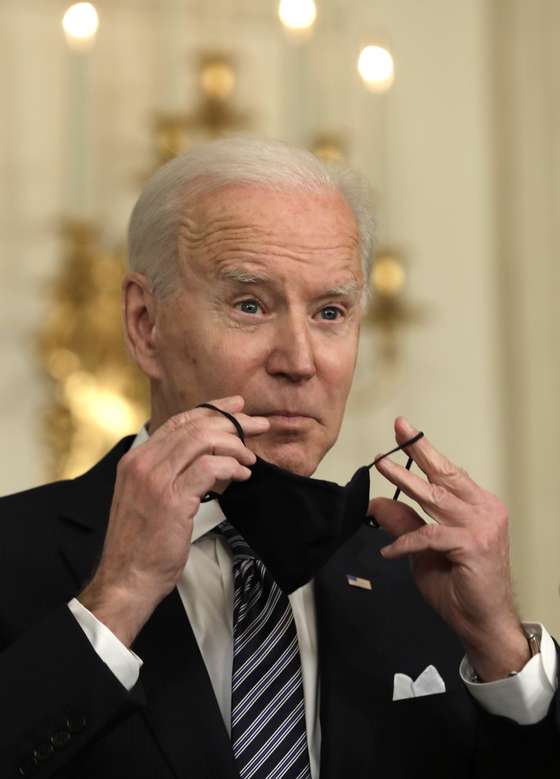![President Biden is taking off his mask before speaking on the stimulus package on the 15th. [UPI=연합뉴스]](https://i0.wp.com/pds.joins.com/news/component/htmlphoto_mmdata/202103/17/03c8fee8-1a30-4837-b76d-5be1a2f9609d.jpg?w=560&ssl=1)
President Biden is taking off his mask before speaking on the stimulus package on the 15th. [UPI=연합뉴스]
Joe Biden’s administration in the United States is pushing for full-scale increase. This is to cover the finances required for the construction of a $1.9 trillion’super’ economic stimulus package and a mega-infrastructure worth more than $3 trillion.
Financial arrangements to support the super stimulus package
Trump’s corporate tax increase
Promotion of lower limit of corporate tax rate with OECD
Increased tax bill, it won’t be easy to pass the parliament
Bloomberg News reported on the 15th (local time), “The Biden administration is pushing ahead with a plan to raise comprehensive federal tax rates such as corporate tax and income tax for large corporations and high-income people.” Bloomberg said this type of comprehensive review of symptoms was the first since the Bill Clinton administration in 1993.
According to Bloomberg, the Biden administration has ▶ increased the highest corporate tax rate from 21% to 28% ▶ Increased the income tax rate for high-income earners with an annual income of $400,000 or more ▶Expanded the scope of imposing real estate taxes ▶For those with an annual capital gain of $1 million or more It is considering raising the Korean tax rate.
In 2017, during the Donald Trump administration, the highest corporate tax rate was cut from 35% to 21%. President Biden, who took office in January, plans to raise the tax rate step by step, seeing that the tax cuts were mainly paid to large corporations.
The Biden administration is also considering reducing tax incentives for so-called’pass-through’ operators. These are people who pay their business profits with personal income tax, not corporate. These pass-through operators include real estate developers. Former President Trump, a former real estate conglomerate, lowered the maximum rate of personal income tax for pass-through businesses from 39.6% to 15%, raising controversy over the’self-cutting’.
President Biden pledged massive fiscal expenditures and tax increases during the presidential election in November last year. In order to minimize the fiscal deficit and increase spending for stimulating the economy, it is believed that an increase in taxation is inevitable.
However, it doesn’t seem easy for a law amendment that includes tax increases to cross the threshold of the US Congress. Not only the opposition Republican Party but also the ruling Democratic Party showed lukewarm reactions. In the US politics, there is a view of concern that the increase may burden the economic recovery in a situation where the unemployment rate is high due to the novel coronavirus infection (Corona 19). Even within the Democratic Party, there are voices saying, “We must postpone the symptoms.” The Hill, a political media in the United States, predicted that if Congress does not pass a tax increase before the midterm elections in November next year, it will not be easy after that.
The Washington Post reported that Finance Minister Janet Yellen is working on a plan to set a lower limit on corporate tax rates in discussions with OECD member countries. This means that countries should refrain from competing to cut corporate tax rates to attract multinational corporations.
President Biden believes that the competition to cut corporate tax rates has deteriorated the financials of each country and has benefited only multinational corporations. Biden’s administration is worried that if other countries maintain or cut the corporate tax rate, if only the US raises the corporate tax rate significantly, the side effects of US companies escaping to other countries may occur.
At a hearing for the approval of the minister in the Senate in January, Secretary Yellen said he would cooperate with the OECD on corporate tax issues. In the OECD, there have been discussions about the lower limit of the global corporate tax rate. The Washington Post said the OECD is likely to suggest a 12% lower limit for corporate tax rates.
However, even if the OECD member countries, led by the United States, reach an agreement with difficulty, questions about the effectiveness may be raised. This is because multinational corporations can move to countries with low corporate tax rates without being affected by the OECD agreement.
Reporter Lee Min-jung [email protected]
![]()
